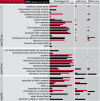Violent Offending Promotes Appetitive Aggression Rather than Posttraumatic Stress-A Replication Study with Burundian Ex-Combatants
- PMID: 26696913
- PMCID: PMC4672083
- DOI: 10.3389/fpsyg.2015.01755
Violent Offending Promotes Appetitive Aggression Rather than Posttraumatic Stress-A Replication Study with Burundian Ex-Combatants
Abstract
Research has identified appetitive aggression, i.e., the perception of committed, violent acts as appealing, exciting and fascinating, as a common phenomenon within populations living in precarious and violent circumstances. Investigating demobilized soldiers in the Democratic Republic of Congo (DRC) demonstrated that violent offending is associated with appetitive aggression and not necessarily with symptoms of posttraumatic stress. In the present study, we sought to replicate these results in an independent and larger sample of demobilized soldiers from Burundi. As with the Congolese ex-combatants, random forest regression revealed that the number of lifetime perpetrated violent acts is the most important predictor of appetitive aggression and the number of lifetime experienced traumatic events is the main predictor for posttraumatic stress. Perpetrated violent acts with salient cues of hunting (pursuing the victim, the sight of blood, etc.) were most predictive for perceiving violent cues appealingly after demobilization. Moreover, the association of violent acts and appetitive aggression as well as traumatic events and posttraumatic stress remains strong even years after demobilization. Patterns of traumatic events and perpetrated acts as predictors for posttraumatic stress and appetitive aggression seem to be robust among different samples of ex-combatants who fought in civil wars. Psychotherapeutic interventions that address these complementary facets of combat-related disorders-namely, posttraumatic stress and appetitive aggression-are indispensable for a successful reintegration of those who fought in armed conflicts and to achieve a successful transition to peace.
Keywords: DDR; DRC; PTSD; aggression; demobilization; ex-combatant; soldier; violence.
Figures

Similar articles
-
Combat high or traumatic stress: violent offending is associated with appetitive aggression but not with symptoms of traumatic stress.Front Psychol. 2015 Jan 7;5:1518. doi: 10.3389/fpsyg.2014.01518. eCollection 2014. Front Psychol. 2015. PMID: 25709586 Free PMC article.
-
Appetitive Aggression and Adverse Childhood Experiences Shape Violent Behavior in Females Formerly Associated with Combat.Front Psychol. 2015 Nov 17;6:1756. doi: 10.3389/fpsyg.2015.01756. eCollection 2015. Front Psychol. 2015. PMID: 26635666 Free PMC article.
-
Predictors of posttraumatic stress and appetitive aggression in active soldiers and former combatants.Eur J Psychotraumatol. 2015 Apr 21;6:26553. doi: 10.3402/ejpt.v6.26553. eCollection 2015. Eur J Psychotraumatol. 2015. PMID: 25908529 Free PMC article.
-
Treating Traumatized Offenders and Veterans by Means of Narrative Exposure Therapy.Front Psychiatry. 2015 Jun 22;6:80. doi: 10.3389/fpsyt.2015.00080. eCollection 2015. Front Psychiatry. 2015. PMID: 26157395 Free PMC article. Review.
-
[Posttraumatic stress disorder (PTSD) as a consequence of the interaction between an individual genetic susceptibility, a traumatogenic event and a social context].Encephale. 2012 Oct;38(5):373-80. doi: 10.1016/j.encep.2011.12.003. Epub 2012 Jan 24. Encephale. 2012. PMID: 23062450 Review. French.
Cited by
-
Appetitive aggression and associated factors among military soldiers retiring from active service in Uganda.Eur J Psychotraumatol. 2025 Dec;16(1):2493026. doi: 10.1080/20008066.2025.2493026. Epub 2025 May 12. Eur J Psychotraumatol. 2025. PMID: 40353681 Free PMC article.
-
Does trauma event type matter in the assessment of traumatic load?Eur J Psychotraumatol. 2017 Jul 6;8(1):1344079. doi: 10.1080/20008198.2017.1344079. eCollection 2017. Eur J Psychotraumatol. 2017. PMID: 28804594 Free PMC article.
-
Psychotherapeutic Intervention in the Demobilization Process: Addressing Combat-related Mental Injuries with Narrative Exposure in a First and Second Dissemination Stage.Clin Psychol Psychother. 2017 Jul;24(4):807-825. doi: 10.1002/cpp.1986. Epub 2015 Dec 16. Clin Psychol Psychother. 2017. PMID: 26676201 Free PMC article.
-
Social Cognitive Training Improves Emotional Processing and Reduces Aggressive Attitudes in Ex-combatants.Front Psychol. 2017 Apr 6;8:510. doi: 10.3389/fpsyg.2017.00510. eCollection 2017. Front Psychol. 2017. PMID: 28428767 Free PMC article.
-
A Possible Anti-anxiety Effect of Appetitive Aggression and a Possible Link to the Work of Donald Winnicott.Scand J Child Adolesc Psychiatr Psychol. 2022 Aug 30;10(1):102-113. doi: 10.2478/sjcapp-2022-0011. eCollection 2022 Jan. Scand J Child Adolesc Psychiatr Psychol. 2022. PMID: 36133733 Free PMC article.
References
-
- Brandt M. J., IJzerman H., Dijksterhuis A., Farach F. J., Geller J., Giner-Sorolla R., et al. (2014). The replication recipe: what makes for a convincing replication? J. Exp. Soc. Psychol. 50, 217–224. 10.1016/j.jesp.2013.10.005 - DOI
-
- Crombach A., Elbert T. (2015). Controlling offensive behavior using narrative exposure therapy: a randomized controlled trial of former street children. Clin. Psychol. Sci. 3, 270–282. 10.1177/2167702614534239 - DOI
-
- Crombach A., Weierstall R., Hecker T., Schalinski I., Elbert T. (2013). Social status and the desire to resort to violence: using the example of Uganda's former child soldiers. J. Aggress. Maltreat. Trauma 22, 559–575. 10.1080/10926771.2013.785458 - DOI
LinkOut - more resources
Full Text Sources
Other Literature Sources
Research Materials

